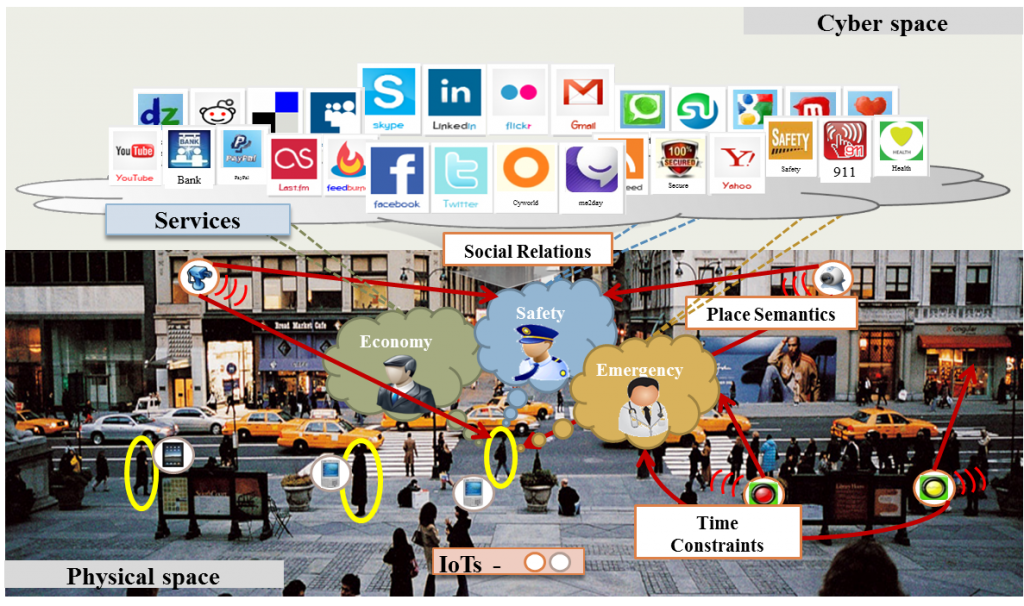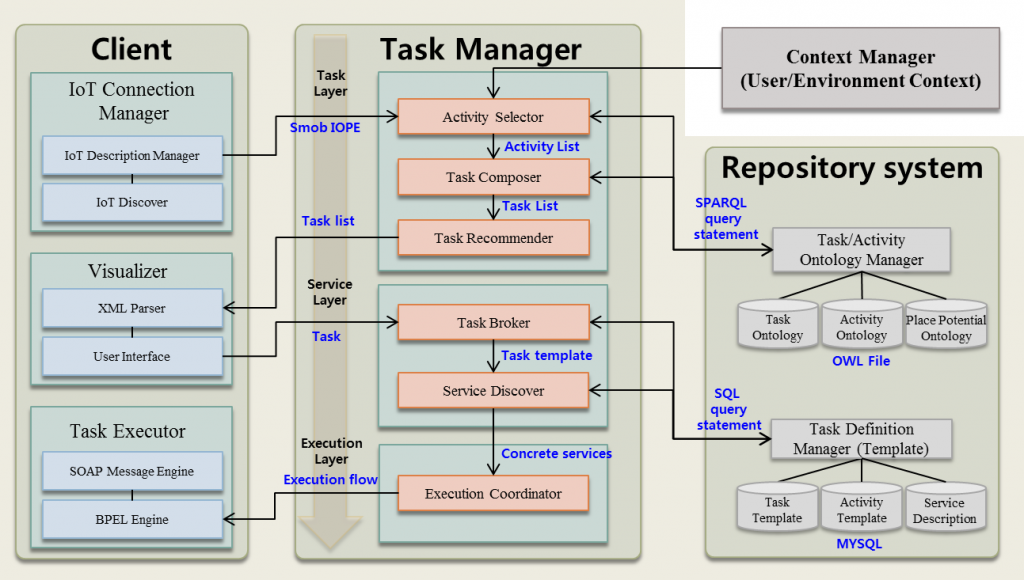Project title: Smart-IoT-based Spontaneous Service Composition
Project period: March 2011 ~ February 2014
Funding organization: Korea Communications Commission
Project summary:
Ubiquitous and urban computing share the goal of enabling users to access networked services and resources anytime, anywhere. The intermesh of planned and situational activities is a distinguishable characteristic of urban computing environments. This produces a diversity of service requirements that need to be tackled by opportunistically suggesting appropriate services to users or social groups, without having a previous definition of applications in templates or any other descriptions in advance. This project leverages the approach of task oriented computing to represent user goals in tasks. A task is composed of unit-tasks: user-centric configurations of abstract service coordinations. The focus of this project is on the provision of a mechanism to cover the spontaneous unit-task composition cycle, based on social, spatial, and temporal aspects. This is realized by identifying the essential semantic elements that describe unit-tasks, urban computing environments, and social groups.
[The Vision of Smart-IoT-based Spontaneous Service Composition]
We have extended a unit-task selection mechanism from our previous work. In addition, in this project, we are developing a set of composability metrics based on social, spatial, and temporal aspects. These metrics concern the measurement of semantic interoperability and potential conflicts between unit-tasks or unit-task composites. These metrics are used to join unit-tasks together in sequences.
The main research issues that we are working on can be summarized into two categories: a task-oriented application framework and semantically-based software composition.
¨ Task-oriented Application Framework
- Supports User-centric Views of Applications
- Enables High-level Software Design (Multiple Abstractions)
- Support Incremental Development
- Improves Reusability
- Improves Application Adaptability to the Environments
¨ Semantically-based Software Composition
- Improves Correctness and Context Awareness
- Supports Semi-automatic Composition
In order to realize our research goal of supporting users’ tasks by an appropriate Internet of Things (IoT) configured by Smart Objects (Smobs) as available in an Urbcomp environment, we identify the following technical requirements: (1) to enable users to select their tasks in their own perspective; (2) to transform users’ task needs into a representation that is machine-processable; (3) to make users’ tasks be supported and enhanced via Smobs in an Urbcomp environment by semantically connecting the gaps among users’ needs, tasks, and Smobs. We reflect these requirements in the system architecture of the task-oriented service framework.
[Task-oriented Service Framework Architecture]
Publications:
Angel Jimenez-Molina, In-Young Ko, “Spontaneous Task Composition in Urban Computing Environments based on Social, Spatial, and Temporal Aspects”, Engineering Applications of Artificial Intelligence (EAAI), Volume 24, Issue 8, December 2011, pp. 1446-1460, Elsevier.
Jang-Ho Choi, Jae-Hyun Cho, Han-Gyu Ko, In-Young Ko, “Distributed Coordination of IoT-based Services by using a Graph Coloring Algorithm”, In Proceedings of the 37th Annual International Computer Software & Applications Conference (COMPSAC2013), July 22-26, 2013, Kyoto, Japan.
Han-Gyu Ko, In-Young Ko, Taehun Kim, Dongman Lee and Soon J. Hyun, “Identifying User Interests from Online Social Networks by Using Semantic Clusters Generated from Linked Data”, In Proceedings of the 1st Workshop on Semantic Social Networks (SSN 2013), Co-located with ICWE 2013, July 8-12, 2013, in Aalborg, Denmark.
Byoungoh Kim, Taehun Kim, Han-Gyu Ko, Dongman Lee, Soon J. Hyun and In-Young Ko, “Personal Genie: A Distributed Framework for Spontaneous Interaction Support with Smart Objects in a Place”, In Proceedings of the 7th International Conference on Ubiquitous Information and Communication (ICUIMC 2013), January 17-19, 2013, Kota Kinabalu, Malaysia.
Angel Jimenez-Molina, Jang-Ho Choi, Jorge Gaete-Villegas, and In-Young Ko, “Cognitive Resources Aware Adaptive Web Service Binding and Scheduling”, In Proceedings of the 2012 IEEE/WIC/ACM International Conference on Web Intelligence (WI-2012), December 4-7, 2012, Macau, China.
Jae-Hyun Cho, Jang-Ho Choi, Han-Gyu Ko, and In-Young Ko, “A QoS-aware Service Composition Method Based on Template Architecture in A Task-oriented Service Framework”, Journal of Korea Information Science Society: Software and Applications, Vol. 39, No. 9, pp. 723-733, September 2012.
Jangho Choi, Han-Gyu Ko, Jae-Hyun Cho, Angel Jimenez-Molina, Jorge Gaete, and In-Young Ko, “A Task-oriented Service Composition for Internet of Things”, In Proceedings of the Triangle Symposium on Advanced ICT 2012 (TriSAI 2012), Tokyo, Japan, September 18-20, 2012.
Jorge Gaete Villegas, Dongman Lee, Meeyoung Cha, and In-Young Ko, “TraMSNET: A mobile social network application for tourism”, In Proceedings of 4th International Workshop on Location-Based Social Networks (LBSN 2012), Sept 8, 2012, Pittsburgh, Pennsylvania, USA (Held in conjunction with Ubicomp 2012).
Jae-Hyun Cho, Jang-Ho Choi, Han-Gyu Ko, and In-Young Ko, “An Adaptive Quality Level Selection Method for Efficient QoS-aware Service Composition”, In Proceedings of the 5th IEEE International Workshop on Service Science and Systems (SSS2012), Co-located with COMPSAC 2012, July 16-20, 2012, Izmir, Turkey.
Jaehyun Jo, Jangho Choi, Hangyu Ko, and In-Young Ko, “A QoS-based Service Composition Method by Using A Task-oriented Service Framework”, In Proceedings of 2012 Korea Conference on Software Engineering (KCSE 2012), Vol. 14 No. 1, February 8-10, 2012, Phoenix Park, Korea.
Patents:
Method and Apparatus for Semantic Annotation Based on Semantic-Cloud, Korea Patent No. 10-1272377, May 31, 2013.
Distribute Coordination Method and System of Task-oriented Services Using Graph Coloring Algorithm, Korea Patent Application No. 10-2013-0035327, April 1, 2013.
Adaptive Quality Level Selection Method for Efficient Quality-Of-Service Based Service Composition and System Thereof, Korea Patent Application No. 10-2012-0032988, March 30, 2012.
Apparatus for making application and recording medium implementing the same, Korea Patent No. 10-1110023-0000, January 19, 2012.
Method and Apparatus for Recommended Semantic Social Network-Based Community, Korea Patent No. 10-1054040, July 28, 2011.


